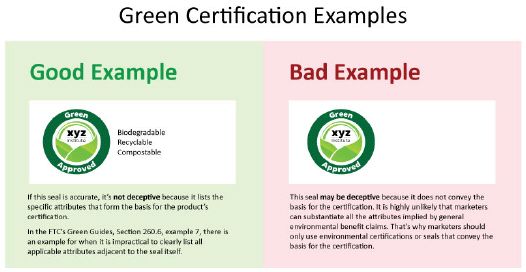- within Corporate/Commercial Law topic(s)
- with Senior Company Executives, HR and Finance and Tax Executives
- in United States
- with readers working within the Accounting & Consultancy, Business & Consumer Services and Healthcare industries
This week, the U.S. Federal Trade Commission (FTC) announced that it has sent warning letters to five marketers of environmental certifications and seals, as well as over 30 product companies displaying those certifications, citing concerns that the certifications failed to comply with the agency's Guides for the Use of Environmental Marketing Claims ("Green Guides"). The Green Guides are part of the FTC's commitment to ensure that marketing statements referencing environmental attributes are truthful and not misleading. Please see our prior client alerts regarding the history of the Green Guides from 2010 and 2012.
The warning letters are a reminder that "green" marketers should ensure that any marketing statements referencing environmental attributes are accompanied by prominent qualifying language that limits the claim to a specific benefit or benefits.
BACKGROUND
The FTC enforces the Federal Trade Commission Act, 15 U.S.C. § 45, which prohibits deceptive advertising. In 2012, the FTC issued updated Green Guides, 16 C.F.R. Part 260. The Green Guides provide marketers with guidance regarding how to make nondeceptive environmental claims, including through environmental certifications and seals of approval.
Specifically, the Green Guides warn marketers that unqualified general environmental-benefit claims likely convey a wide range of meanings, including that a product has specific and far-reaching environmental benefits, and that an item has no negative environmental impact. The Green Guides state: "Because it is highly unlikely that marketers can substantiate all reasonable interpretations of these claims, marketers should not make unqualified general environmental benefit claims." 16 C.F.R. § 260.4(b).
For example, suggesting that a product is, in general, "environmentally friendly" or "green" has been prohibited by the Green Guides since their inception. The Green Guides advise marketers that they may prevent deception by accompanying the seal with "clear and prominent qualifying language that clearly conveys that the certification or seal refers only to specific and limited benefits." 16 C.F.R. § 260.6(e). Such qualifying language could include terms such as "biodegradable," "recyclable," or "compostable." Id. §§ 260.7, 260.8, 260.12. The Green Guides also provide guidance on how to effectively qualify a certification based on broad-based, multiattribute standards.
The FTC's announcement also provided graphic examples of "good" and "bad" certifications:

Of course, not only must such specific attributes be identified, but their truthfulness must be substantiated.
LITIGATION REGARDING THE GREEN GUIDES
In California, public prosecutors, including the California attorney general and county district attorneys, have prosecuted numerous green marketing cases using the broad powers granted by the Unfair Competition Law, Cal. Bus. & Prof. Code § 17200 et seq., and California's green advertising law, Cal. Bus. & Prof. Code § 17580 et seq. The California green advertising law incorporates the FTC's Green Guides by reference, and provides that conformance to the Green Guides is a defense to lawsuits brought under that section. Plaintiffs' lawyers have also brought several private consumer class actions against consumer product companies under the California Consumer Legal Remedies Act, Cal. Civ. Code § 1750 et seq., among other laws, asserting that their green claims were false and misleading, and that consumers who relied on such claims deserve refunds.
Companies making green claims should also note that state laws may impose additional requirements. For example, California law prohibits any claim that plastic is "biodegradable," "degradable," or "decomposable," or any form of those terms, or that in any way implies that the plastic product will break down, fragment, biodegrade, or decompose in a landfill or other environment. Claims that products are "compostable," "home compostable," or "marine degradable" must be proven using ASTM testing methods. Cal. Pub. Res. Code § 42356 et seq. The state's prosecutors actively enforce these requirements.
Morrison & Foerster LLP has been at the forefront of counseling and litigating green marketing matters. As a result of our broad experience in the clean technology sector, we are able to effectively advise clients on the risks and exposure related to “greening” a company, especially if socially responsible or environmental attributes are communicated on products and labels. Our attorneys also help clients construct and refine marketing claims and advertisements that reference the green or environmental attributes of a company or its products, services, or operations while minimizing associated enforcement and litigation risks. Should litigation become necessary, our firm has deep expertise defending and resolving federal and state government enforcement actions, litigation, consumer class actions, and administrative actions related to social responsibility, sustainability, and various green representations and claims.
RECOMMENDATIONS REGARDING COMPLIANCE WITH THE GREEN GUIDES
While many companies seek to promote themselves and their brands to customers as socially responsible or environmentally positive, any such representations or claims should be scrutinized closely for compliance with the Green Guides, as well as other federal and state laws and regulations. Companies should also make certain that their claims meet state law requirements.
Because of the generality of this update, the information provided herein may not be applicable in all situations and should not be acted upon without specific legal advice based on particular situations.
© Morrison & Foerster LLP. All rights reserved
[View Source]

